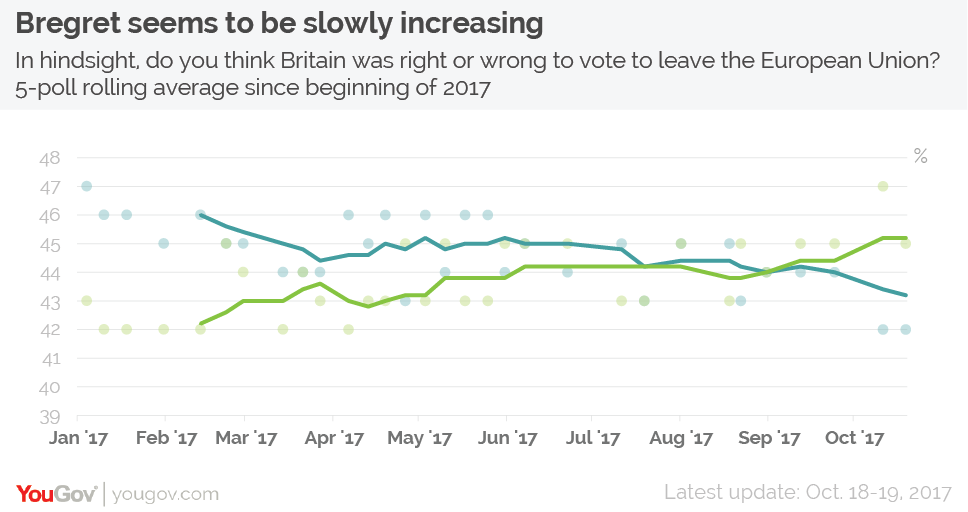YouGov have carried out some polling recently that lends support to the belief that opinion on Brexit is starting to change. The pro-Brexit press have made great play about the number of people that voted remain but who now accept the result and just want to get on with it. This has always been taken to mean the nation is coming together behind Brexit, something I have never accepted and there are clear signs now that this is changing.
I have been following the results of 45 polls since August 2016 asking in hindsight if the decision to leave was right or wrong and I have posted about it before (HERE). YouGov have produced a rather neat graph below showing the results. RIGHT is in blue and WRONG in green:

But now YouGov have carried out more detailed polling (HERE) and asked people which of four different routes they would prefer the Brexit process take. Forty per cent wanted to continue with Brexit on current negotiating terms, whilst 12 per cent wanted Britain to seek a “softer” Brexit – meaning a “go ahead” majority of 52 per cent. YouGov go on to say:
Just 18 per cent wanted a second referendum and a further 14 per cent wanted Brexit abandoned completely, a total of 32 per cent for an “attempt to reverse” Brexit. The remaining 16 per cent said they didn’t know.
The main reason there are so many more people wanting Brexit to proceed rather than halted is because some Remain voters, though still thinking that leaving is the wrong decision, believe that the result of the referendum should be respected. (Previous YouGov research on this group labelled them “Re-leavers”). For example, whilst eight in ten (79 per cent) Leave voters pick one of the “go ahead” options, so do 28 per cent of Remain voters.
This might be changing, though.
Over the past few months, Remain voters’ views have started swinging back towards wanting Britain to stay in the EU. While in June a majority of Remain voters (51 per cent) supported a “go ahead” option, by the end of September this had fallen to 28 per cent. Over the same period the proportion of Remain voters backing an “attempt to reverse” approach rose from 44 per cent to 61 per cent.
As we get further and further away from the referendum itself more people might start to think it is legitimate to try to stop Brexit, and eventually there could be a majority that want to stop Brexit.
In the three months from June to September the number of remain voters supporting one of the leave options has dropped by almost a half while the number who want to reverse Brexit has increased by a third! These are very big changes. And note that only 79% of leave voters opted for one of the leave options. This is a surprise to me but YouGov do not discuss it at all.
I believe this is all consistent with a swing against Brexit, maybe not enough at the moment but there are seventeen months to go with many pitfalls along the way. Brexiteers and their allies in the press continue to push for Brexit but increasingly, huge problems are being revealed and no amount of bluster can hide the truth for ever. You can fool some of the people all of the time, you can fool all the people some of the time but you can't fool all the people all of the time.
Against this there is some research from Wales (HERE) that tries to discover why people voted to leave the EU and finds many still believe their vote was right - because the EU never did anything for them - and little sign of minds being changed. Even that we have to endure short term pain in order to get to some bright future where we will all be better off.
I think this would be generally replicated in England at the moment and is no more than I would expect. The process of changing public opinion is going to be slow to start with, certainly while the economic effects are small, but as time goes on and the full import of becoming a third country becomes apparent, I think the trickle of people having second thoughts will increase. Welsh farmers in particular will be badly affected and the Airbus factory in North Wales may face long term threats to its future. These things will concentrate minds and I'm sure opinion will change.